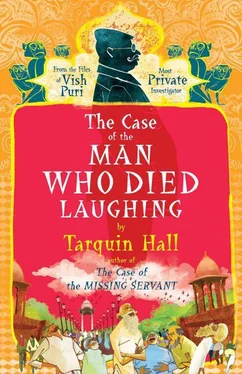Puri thought for a moment and then said: “One thing I am getting confusion over. Assuming it’s true your former partner betrayed you, why you’ve got tension about revealing his past?”
“Haven’t you heard, Mr. Vish Puri, sir? Maharaj Swami is now one of the most powerful men in India. The prime minister doesn’t go to the toilet unless he okays it. He could make life very uncomfortable for me.”
It was obvious to Puri that although the magician had made a pretense of not wanting to reveal what he knew about Maharaj Swami, he was only too happy to pass on what he knew.
“I take it you would not shed too many of tears in the event Swami-ji ended up behind bars,” he said.
Manish the Magnificent smiled. “Not many, no.”
“Then we have something in common – us two.”
“I suppose so,” the magician answered begrudgingly.
“Very good! So what else you can tell me about your friend Aman?”
“Only that he’s the most gifted magician I’ve ever come across. If anyone could have pulled off the illusion on Raj-path, it’s him.”
“What about his character?”
“He’s a perfectionist. I never knew him to give up on anything.”
“Any habits – drugs, alcohol?”
“Nothing.”
“Women?”
“He was always nervous around them.”
Puri made a note of this.
The magician remembered something else.
“Aman had this habit of collecting things – little mementos from places he’d been,” he said. “Railway ticket stubs, menus from restaurants, postcards. It was a kind of obsession with him. He used to keep a diary as well. He left it out once and I read some of it. He had written down everything that had happened to him – dates, names – along with notes and diagrams on the magic tricks he was developing.”
“He kept all these things where exactly?”
“In a silver metal trunk.”
National Highway 58, which ran for 334 miles northeast of Delhi, had been under construction for nearly a decade. The few sections that had been completed between Ghaziabad and the holy city of Haridwar offered three smooth lanes in both directions. Drivers reaching one of these stretches experienced instant elation, as if they had entered a vehicular promised land where there were no tedious, terrestrial speed limits.
But the euphoria was short-lived. After just a few miles, each tarmac tract ended abruptly in a rugged tear – the destructive influence of corruption and ineptitude, and not, as it perhaps appeared, an act of God. Even the most robust of vehicles had to brake suddenly and inch down sharp inclines into a purgatory of rutted, potholed tracks.
Windows were hastily rolled up as tires stirred clouds of fine white dust. Through this choking pall, drivers and passengers passed laborers with bleached faces breaking piles of rocks with chisels and crude hammers. Rows of concrete supports for half-complete flyovers appeared suddenly, giant and potentially lethal obstacles. Rusty construction equipment stood idle like tanks abandoned by a fleeing army.
That Puri was able to sleep soundly through all this – head back, mouth agape, snoring loudly – was thanks to an inherited but yet-to-be-identified Punjabi gene that endowed him with the power to snooze through almost anything. But it helped that he was exhausted from his encounter yesterday with the cricket bat in Dr. Jha’s office followed by a long day of interviews.
It had been almost eleven o’clock by the time he reached the Mount Kailash Hotel, a seedy ‘businessman’s lodge’ off Connaught Place, where he had spent an hour.
Room 312 had been registered to ‘Miss Neena’, who had an understanding with the discreet manager.
‘Miss Neena’ was but one of the lovely young woman’s aliases. Indeed, she used so many that even Puri, who had been making use of her services for nearly five years, sometimes lost track of who she was pretending to be at any given time.
Had she ever told him her real name? he sometimes wondered.
What he knew of her past was certainly sketchy, pieced together from scraps of information.
Originally from Kathmandu, she had run away from home as a teenager to join the Maoist rebels, undergone combat training in a camp in the mountains and taken part in numerous guerrilla operations against the Nepali state. During one of them, she had witnessed or experienced something terrible. Disillusioned with the cause, she had fled and escaped to India.
For the next few years, she had rambled across northern India. She spent a year with a traveling theater troupe in Assam and worked as a bar girl in Mumbai and an ayah for a wealthy Delhi family. In between, there had been a marriage that ended disastrously.
Puri had also noted the following characteristics about her: she didn’t trust the opposite sex; considered alcohol nothing short of evil; was a night owl; could handle herself in a fight better than most men.
There was a distinct possibility that she had a child (a couple of times on the phone he had heard crying in the background). But Puri had never visited her home or pried into her private life.
Indeed, despite her secretive nature, their relationship was based on mutual trust. They had met in Mumbai during the Case of the Deaf Dabawallah when Puri had saved her life. Subsequently, she had moved to Delhi to work for him as an undercover operative.
Given her talent for blending into almost any situation and ‘putting on so many of faces’, he had dubbed her Facecream.
Now he was asking her to take on a task that would stretch even her considerable resources: to infiltrate the Abode of Eternal Love, Maharaj Swami’s ashram north of Haridwar.
Last night, in the Mount Kailash Hotel, she had listened attentively to Puri’s briefing.
“Frankly speaking, thus far, nothing has come to light linking Swami-ji directly with the murder,” he’d told her. “But I am in possession of Dr. Jha’s file on ‘His Holiness’ and grounds for investigation are there – no doubt about it at all. Dr. Jha spoke to three of Swami-ji’s ex-associates – naturally it was off record – and seems our Godman is very much active in money laundering for politicians. This Abode of Eternal Love is also Abode of Washing Machines, we might say. Black money goes in and comes out white.
“Through Right to Information Act,” Puri had continued, “Dr. Jha was endeavoring to prove Swami-ji’s corrupt practices. Thus, he had petitioned for financial statements of numerous ashram bank accounts in India and Switzerland to be made public. Thus Dr. Jha had become a thorn in Swami-ji’s side.”
“Dr. Jha had political enemies,” Facecream had pointed out. “It could have been one of them who killed him.”
“Bullets delivered to the backs of heads are more their style, no?”
Puri had also briefed Facecream on what Manish the Magnificent had told him about Maharaj Swami’s secret past and about his being an obsessive hoarder of personal memorabilia. He left the file with her to study.
On the journey along Highway 58 this morning, she had been reading through the information Dr. Jha had acquired about the death in April at the ashram of twenty-six-year-old devotee Manika Gill. There were press cuttings, copies of police reports, ‘witness’ statements and affidavits from the girl’s family. Dr. Jha’s notes and transcripts of interviews he had conducted with some of her friends and the local farmer who had found the body lying facedown in the river were also included.
Facecream was able to glean the following:
Prior to coming to the ashram, Manika, whose father was a wealthy jeweler, had been a ‘rebellious type’. During her late teens and early twenties, she had ‘entered into’ a number of casual sexual relationships. At twenty-five, she had found herself pregnant. At her father’s insistence, she had ‘gone in for’ an abortion. Naturally this was hushed up; apart from her parents, only her best friend, Neetu Chandra, had known about it.
Читать дальше












